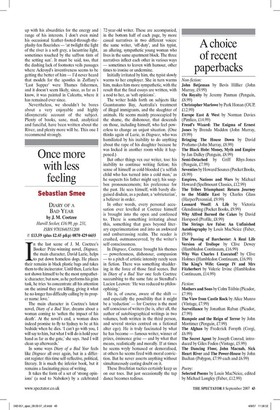Once more with less feeling
Sebastian Smee DIARY OF A BAD YEAR by J. M. Coetzee Harvill Secker, £16.99, pp. 231, ISBN 9781846551208 £13.59 (plus £2.45 p&p) 0870 429 6655 In the last scene of J. M. Coetzee's Booker Prize-winning novel, Disgrace, the main character, David Lurie, helps to put down homeless dogs. He places their remains in black plastic bags and takes them to the incinerator. Until then, Lurie has not shown himself to be the most sympathetic character; but now, as he performs his grim task, he tries 'to concentrate all his attention on the animal they are killing, giving it what he no longer has difficulty calling by its proper name: love.'
The main character in Coetzee's latest novel, Diary of a Bad Year, dreams about a woman coming to 'soften the impact of his death'. At the novel's end, a woman does indeed promise to fly to Sydney to be at his bedside when he dies. 'I can't go with you, I will say to him, but what I will do is hold your hand as far as the gate,' she says. 'And I will clean up afterwards.'
In some ways Diary of a Bad Year feels like Disgrace all over again, but in a different register: this time self-reflective, political, literary. It is much the inferior book, but it remains a fascinating piece of writing.
It takes the form of a set of 'strong opinions' (a nod to Nabokov) by a celebrated 72-year-old writer. These are accompanied, in the bottom half of each page, by more casual narratives in two different voices: the same writer, 'off-duty', and his typist, an alluring, sympathetic young woman who lives in the same apartment block. The three narratives inflect each other in various ways — sometimes to leaven with humour, other times to ironise or undermine.
Initially irritated by him, the typist slowly warms to her employer. She in turn warms him, makes him more sympathetic, with the result that the final essays are written, with a nod to her, as 'soft opinions'.
The writer holds forth on subjects like Guantanamo Bay, Australia's treatment of illegal immigrants, and the slaughter of animals. He seems mainly preoccupied by the shame, the dishonour, that descends on those, including himself, who feel powerless to change an unjust situation. (One thinks again of Lurie, in Disgrace, who was humiliated by his inability to do anything about the rape of his daughter because he was locked in another room while it happened.) But other things vex our writer, too: his inability to continue writing fiction; his sense of himself as cold-blooded Ca selfish child who has turned into a cold man,' as he suspects his father might say); his soapbox pronouncements; his preference for the past. He sees himself, with barely disguised disdain, as a pedant, a `sobrietarian', a believer in order.
In other words, every personal accusation ever levelled at Coetzee himself is brought into the open and confessed to. There is something irritating about this, something that goes beyond literary experimentation and into an awkward and embarrassing realm. The reader is crushed, outmanoeuvred, by the writer's self-consciousness.
In Disgrace, Coetzee brought his themes — powerlessness, dishonour, compassion — to a pitch of artistic intensity rarely seen in fiction. There was something shuddering in the force of those final scenes. But in Diary of a Bad Year one feels Coetzee succumbing to the same fate as Stendhal's Lucien Leuwen: 'He was reduced to philosophising.'
He is, of course, aware of the shift — and especially the possibility that it might be a 'reduction' — for Coetzee is the most self-conscious of writers (he is, after all, the author of autobiographical writings in two volumes, both written in the third person, and several stories centred on a fictional alter ego). He is truly fascinated by what he has become — famous writer, winner of prizes, eminence grise — and by what that means, realistically and morally. If at times he seems wryly bemused or demoralised, at others he seems fired with moral conviction. But he never asserts anything without simultaneously casting doubt on it.
These Brechtian tactics certainly keep us on our toes. But just occasionally the tap dance becomes tedious.



































































 Previous page
Previous page